人教版选修七Unit 1 《Living well》word教案3
高中英语人教版选修7Unit1LivingwellGrammar教案(系列三)

选修七Unit1 Living wellPeriod3 Grammar定义:动词不定式是非谓语动词的一种,它没有人称和数的变化,在句子中不能独立作谓语,但它仍保持动词的特点,可以有自己的宾语和状语。
E.g. He wants his students to read the book aloud.一、不定式的意义1. 不定式的一般式:一般式表示的动作或状态发生在谓语动词表示的动作或状态的同时或之后。
当不定式的逻辑主语是这个不定式所表示的动作的承受者时,不定式一般要用被动式(to be done).eg: He seemed to be tired. The building to be finished next month is for our teachers.2. 不定式的进行式:进行式表示动作正在进行,与谓语的动作同时发生。
e.g. When I went to his home, he happened to be traveling around the world.3. 不定式的完成式:如果不定式所表示的动作或状态发生在谓语动词所表示动作或状态之前,就用完成式;若是在此基础上的被动含义,就用完成被动式( to have been done).e.g. He is said to have written a novel about the Long March.He is said to have been taught French when he was a child.4. 不定式的完成进行式:如果不定式的动作是在谓语所表示的时间之前一直在进行或有可能继续进行的动作,就要用完成进行式.eg: We’re happy to have been working with the experts all the month.二、不定式的用法:动词不定式具有名词、形容词和副词的特征。
人教版高二英语选修七Unit1 Living well教案设计
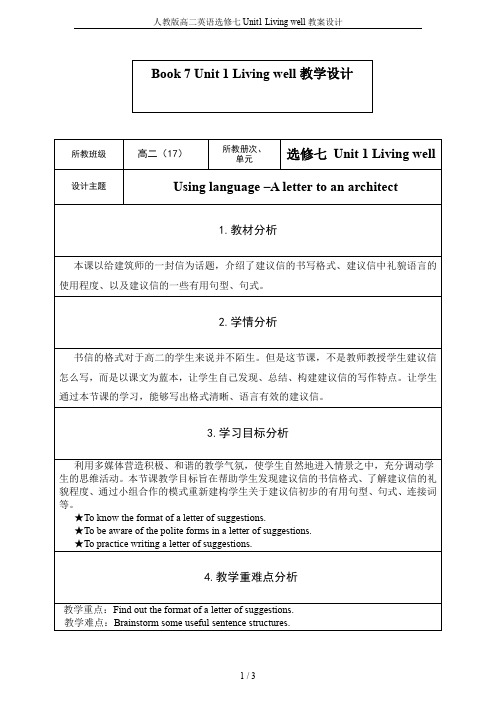
教学重点:Find out the format of a letter of suggestions.
教学难点:Brainstorm some useful sentence structures.
5.教学过程设计
教学步骤
教学活动
设计意图
时间安排
Step1
Skimming
Let students glance through the text quickly and understand three questions:
2.学情分析
书信的格式对于高二的学生来说并不陌生。但是这节课,不是教师教授学生建议信怎么写,而是以课文为蓝本,让学生自己发现、总结、构建建议信的写作特点。让学生通过本节课的学习,能够写出格式清晰、语言有效的建议信。
3.学习目标分析
利用多媒体营造积极、和谐的教学气氛,使学生自然地进入情景之中,充分调动学生的思维活动。本节课教学目标旨在帮助学生发现建议信的书信格式、了解建议信的礼貌程度、通过小组合作的模式重新建构学生关于建议信初步的有用句型、句式、连接词等。
Para1 .your writing purpose
Para2. the suggestions and measures
Para3. Your hopes and wishes
通过对文章整体格式的把握,以及每个段落细节的研讨,弄清建议信的格式,每个段落的写作内容。
10分钟
Step4
Learn and share some useful sentences structures about each paragraph.
★To know the format of a letter of suggestions.
人教版选修七Unit 1 《Living well》word教案

Unit 1 Living well Ⅰ. 单元教学目标技能目标Skill Goals▲Talk about disability and life of disabled people▲Express wishes & congratulations▲Learn expressions of formal introduction▲Revise the Infinitive▲Write a letter of suggestionⅡ. 目标语言功能句式IntroductionI’d like to introduce you to ...I’d like you to meet ...May I introduce ...?Pleased to meet you.It’s nice to meet you.Wishes & congratulationsCongratulations.All the best.I’m proud of you.I wish you success.Good luck.Well done.I’m very impressed by your performance.You have my best wishes.I’m very pleased for you.I hope it goes well for you.That’s wonderful/amazing.1.四会词汇disability, disabled, eyesight, ambition, beneficial, clumsy, adapt,词汇microscope, absence, fellow, annoy, annoyed, industry, tank, encouragement, conduct, politics, literature, resign, companion, assistance, congratulate, graduation, basement, accessible2.认读词汇syndrome, Rosalyn, Sally, Marty, fulfilling, Kilimanjaro, Qomolangma, wheelchair, Sanders, earphone, impair, community3.词组in other words, adapt to, cut out, out of breath, all in all, sit around, as well as , make fun of, never mind, all the best, meet with4.重点词汇disability, disabled, adapt, annoy, conduct, congratulate, accessible结构Revise the InfinitiveThe infinitive can be used:1. as the subject2. as the predicative3. as the object4. as the object complement5. as the adverbial6. as the attribute重点句子1. …but I am very outgoing and have learned to adapt to my disability.P22. Every time I returned after an absence, I felt stupid because I was behind the others. P23. All in all, I have a good life. P24. Just accept them for whom they are and give them encouragement to live as rich and full a life as you do. P3Ⅲ. 教材分析和教材重组1. 教材分析本单元以残疾和残疾人的生活为话题,介绍了一些残疾人凭借顽强的毅力和社会的关爱克服生活中的种种困难,以积极的态度面对人生挑战的故事。
高中英语人教版选修7教案-Unit_1_Living_well_教学设计_教案

教学准备1. 教学目标知识目标 To master the useful expressions and sentences in the text.能力目标 To learn the text well and improve students’ reading ability.情感目标 To be positive and strong-minded when in trouble.2. 教学重点/难点重难点句型 1. Every time I returned after an absence, I felt stupid because Iwas behind the others.2. As well as going to the movies and football matches with friends, I spend a lot of time with my pets.3. I have a very busy life with no time to sit around feeling sorry for myself.4. Just accept them for who they are, and give them encouragement to liveas rich and full a life as you do.3. 教学用具4. 标签教学过程Step I: Display the preview workAsk several students to write down the preview work on the blackboard. Then check the answers together and remember them after class.Step II: Lead-inT: Well down. All of you did good jobs. I’d like you appreciate a picture. Please look at the screen. Dou you know him?S:T: His name is Nick Vujicic. From this picture, we can see he has no arms and legs, but a small foot. Would you like to know more about him? Let’s see a short video.T: Nick is positive and he tells us the disabled can live well. Inthis class, another disabled person Marty will tell us his story. Let’s come to Marty’s storyStep Ⅲ: Reading comprehensionTask1:Fast readingT: Skim the text to match the main idea of each paragraphPara.1 a) Marty met with a lot of difficulties at schoolPara.2 b) How his life has become easierPara.3 c) The advantages of his diseasePara.4 d) An introduction to Marty and his muscle diseasePara.5 e) How his disability developedTask2: Detailed readingT: Since we know the structure of the text, let’s learn some details about Marty. Read paragraph1 quickly and finish exercise2.1. When Marty says “I am one in a million”, he really means _____.A. he is uniqueB. he has a rare diseaseC. he has a muscle diseaseD. he lives a hard but happy life2. What does “live one day at a time” mean?T: Although Marty developed a rare disease, he is also optimistic. Can doctors cure him of his disease? With this question, let’s read paragraph2&3 and deal with exercise3.1. Why did the doctors cut out a piece of muscle from Marty’s leg?A. Because they could cure the disease by cutting it out.B. Because they wanted to use it as a specimen (标本).C. Because they would transplant (移植) the new muscle.D. Because they wanted to find out the cause of the disease.2. Which sentence can be replaced by the following one?After many tests in hospital, doctors still can’t find out the cause of the disease. And I don’t know what will come up in the future.T: It is a pity that doctors can’t find out the cause. If you were Marty, what would you do?S:T: What about Marty? Let’s come to paragraph4 and finish exercise4.1. What are Marty’s ambition, achievements and hobbies?T: Are you inspired by Mary’s positive attitude? If you meet a disabled person, what would you like to do? Marty not only achieved great success but also had something to tell us. Then read last paragraph and write down the answers about exercise5.2. What are Marty’s suggestions to healthy children?Task 3: Further readingT: After reading this text, what kind of person do you think Marty is?S:T: Excellent! Let’s read the text for the third time and have abetter understanding of Marty’s story.T: Work in pairs and deal with exercise 6.1. Every time I returned after an absence, I felt stupid because I was behind the others.2. As well as going to the movies and football matches with friends,I spend a lot of time with my pets.3. I have a very busy life with no time to sit around feeling sorry for myself.4. Just accept them for who they are, and give them encouragement to live as rich and full a life as you do.Step IV: SummaryT: According to Marty’s Story, fill in the blanks.Marty has a muscle disease that makes him very weak. Sometimes he is very (1) __________ and drops things or (2)________ into furniture. However he is very (3) ___________ and has learnt to(4)______________ his disability.Though (5) _________, he doesn’t look any different from others, so sometimes some children in his primary school would laugh at him. When he got (6) ______________after running a short way. His life is a lot easier at high school because his (7) _______ students have accepted him.(8)_______________, he has a good life, he is happy to have found many things he can do. His (9) __________ is to work for a firm that develops computer (10) ________ when he grows up.Step V: Free debateT: Do you know how many disabled people are there in China?S:T: Let’s look at the screen. Do you think disabled people can live a happy life like normal people now?S:T: I’d like to divide you into 2 parts. Some are for it while the others are against it. Work in group and have a debate.S:T: Different people have different opinions. They are physically disabled, but mentally strong. I firmly believe they can live well. At last, One sentence for you from Tai Lihua--Hope you can be cheerful and positive when you meet with difficulties in the future.课后习题作业1. Review what we have learnt.2. Write a short article about whether the disabled can live a happy life.。
高中英语人教版选修7教案-Unit_1_Living_well_教学设计_教案_1

教学准备1. 教学目标Teaching goals教学目标1. Ability goals 能力目标1.1 To help students develop their reading ability by skimming for main ideas and reading for details.1.2 To help students solve the reading problems with the teacher’s guidance2. Learning ability goals 学能目标2.1 Let the Ss know that sea animals are parts of human beings’ life.2.2 Help the Ss know the importance of the relationship between animals and humans through reading.2. 教学重点/难点Teaching important points 教学重难点1.Help to comprehend the text and grasp the main idea of the text.2. Help the Ss know the animals’ loyalty and help to human beings.3. 教学用具4. 标签教学过程Teaching procedures && ways教学过程与方式Step Ⅰ Warming up1. Review the names of some sea animals.Step Ⅱ Pre-reading1. Some knowledge about killer whales and baleen whales.2. Read the introduction of the text on page 19 and fill in the following table.Attention:While reading, pay attention to the 5Ws(who, when, where, what, why) and 1H(how) of narratives. As for who, pay attention to the names; and when, pay attention to the numbers.Step Ⅲ Reading comprehending1. SkimmingTask 1: Complete the main ideas using two verbs。
人教选修七 Unit1 Living well 教案
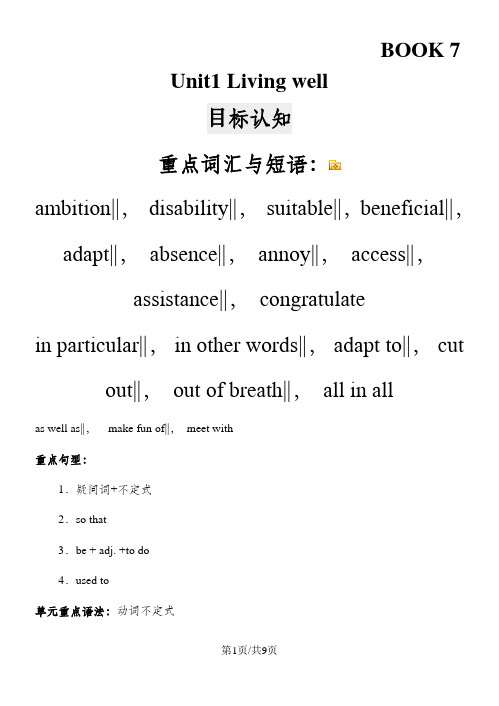
BOOK 7Unit1 Living well目标认知重点词汇与短语:ambition||,disability||,suitable||,beneficial||,adapt||,absence||,annoy||,access||,assistance||,congratulatein particular||,in other words||,adapt to||,cut out||,out of breath||,all in allas well as||,make fun of||,meet with重点句型:1.疑问词+不定式2.so that3.be + adj. +to do4.used to单元重点语法:动词不定式重点词汇ambition【原句回放】Her ambition is to become part of the national team for the next Paralympic Games.(Page 1)【点拨】ambition: determination to be successful||,rich||,powerful etc. 用作不可数名词表“雄心||,抱负”;用作可数名词表“渴望得到或追求的东西”||。
【拓展】ambitious (a.有雄心的)常用短语:be ambitious for sth/to do sth 对(做)某事怀有雄心/热切的希望suitable【原句回放】Although some may think the cinema is noisy||,it is suitable for Sally's condition.(Page 1)【点拨】suitable:adj.合适的||,适宜的||。
常用短语:be suitable for sb./sth. be suitable to do sth.【拓展】suit (v.)适合||,相称;(n.)一套(衣服)||,套装disability【原句回放】Do you know anyone with a mental or physical disability? (Page 1)【点拨】disability:being unable to do sth.||,esp. taking away the power of using the leg or arm. 用作可数名词表“残疾”;用作不可数名词表“无能、劳动能力丧失”||。
高中英语选修7 Unit 1 Living well period 3 教案1 精
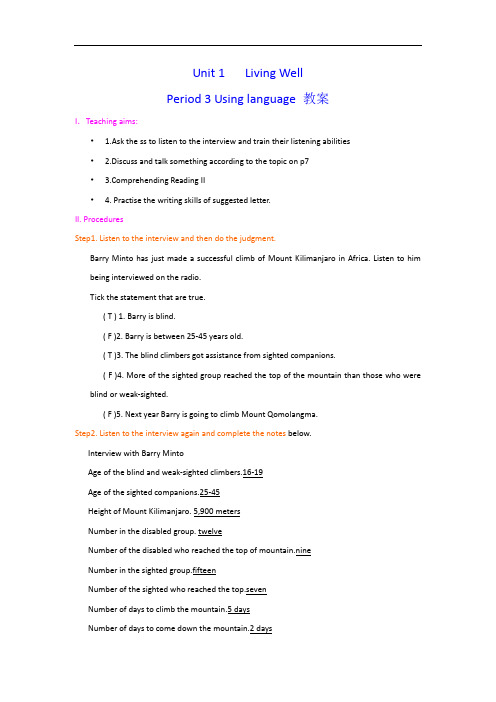
Unit 1 Living WellPeriod 3 Using language 教案I.Teaching aims:• 1.Ask the ss to listen to the interview and train their listening abilities• 2.Discuss and talk something according to the topic on p7• prehending Reading II• 4. Practise the writing skills of suggested letter.II. ProceduresStep1. Listen to the interview and then do the judgment.Barry Minto has just made a successful climb of Mount Kilimanjaro in Africa. Listen to him being interviewed on the radio.Tick the statement that are true.( T ) 1. Barry is blind.( F )2. Barry is between 25-45 years old.( T )3. The blind climbers got assistance from sighted companions.( F )4. More of the sighted group reached the top of the mountain than those who were blind or weak-sighted.( F )5. Next year Barry is going to climb Mount Qomolangma.Step2. Listen to the interview again and complete the notes below.Interview with Barry MintoAge of the blind and weak-sighted climbers.16-19Age of the sighted companions.25-45Height of Mount Kilimanjaro. 5,900 metersNumber in the disabled group. twelveNumber of the disabled who reached the top of mountain.nineNumber in the sighted group.fifteenNumber of the sighted who reached the top.sevenNumber of days to climb the mountain.5 daysNumber of days to come down the mountain.2 daysStep3.Listen to the latter part of Barry’s story where the interview congratulates Barry and wishes him future success, then complete Joan’s sentences.Barry: Of the 15 sighted climbers, only 7 made it.Joan: Oh, well done!Barry: Yes, it just shows you how determined the blind climbers were.…Joan: Well, Barry. I’m full of admiration for you and your companions. You have achieved something quite remarkable.Barry: Thanks. We’re very proud of ourselves.Joan: Mm, you should be. So, Barry, what’s your next big challenge?Barry: My ambition is to climb Mount Qomolangma one day.Joan: Amazing. I wish you every success in the future.Step4. Wishes & congratulationsExpressions:Congratulations.All the best.I’m proud of y ou.I wish you success.Good luck.Well done.I’m very impressed by your performance.You have my best wishes.I’m very pleased for you.I hope it goes well for you.That’s wonderful/amazing.Dialogue practising (10m)In pairs make a short dialogue in which you offer congratulations and best wishes to your partner. First read the situations below and choose one of them.Suggested answer:Situation 1: Student A has just passed his/her final exam.A: This letter has just arrived. It’s about my exam.B: Well, open it.A: It says I’ve passed.B: Congratulations. That’s wonderful.Situation 2: Student B has just started a new job.A: Your mother told me you have just started a new job.B: Yes. I’m working at the television station now.A: Really? That’s g reat! I hope it goes well for you.B: Thanks. I hope so too.Situation 3: Student A has just won a gold medal in the city sports competition.B: Let’s see your medal.A: Here it is.B: It’s beautiful! Well done.A: ThanksSituation 4: Student B’s team has just won a football match.A: You look happy, what’s up?B: our team just won.A: Wow! That’s wonderful. You deserve it after training so hard.B: Yeah. And if we keep training like that we should win more games.A: I’m sure you will. Keep up the good work.Situation 5: Student A has just received her graduation certificate.A: Here it is at last, my graduation certificate.B: Let me see. Well done. I’m so proud of you.Situation 6: Student B has invented a new computer game.A: Did you really invent a new computer game?B: Yes, I did and a computer company is going to buy it.A: That’s amazing. I’m really impressed.Step5.Look at the pictures. Discuss the problems that people with walking difficulties might have in a cinema.Step5. Reading II A Letter to an ArchitectRead the text and do the exercisesSkimming questions:1.From the text we know that Alice Major advised the architect to consider _____ things.A Two B. three C. four D. five2.If the lifts are at the back of the cinema in cold, unattractive areas, this will make disabled people feel they are _____ other customers.A. more important thanB. as important asC. twice as important asD. less important than3. What does “hearing-impaired” mean?A. 耳聋的B. 听力受损的C. 耳朵修理的4.Which of the following is not true ?A.The buttons in the lift should be easy for people in wheelchairs to reach.B. There should be earphones beside someseats in a special area.C. There should be toilets for the disabled near the entrance to the cinema.D. There should be car parking spaces for thethe disabled and elderly.5. The writer wrote the letter to _____A.Remind the architect of the disabledB.Protect the rights of the disabledC.Show the attitude of being treated equally to the able-bodied peopleD.All of aboveStep6. Read again and do more exercises.1.What is the purpose of the first paragraph of the letter?2.Why do you think the writer has numbered her suggestions and useditalics?3.What is the purpose of the last paragraph?4.Can you think of any other things that the cinema could do to makeit accessible to disabled people?Scanning1. What is the purpose of the first paragraph of the letter?To tell the reader the purpose of the letter.2. What do you think the writer has numbered her suggestions and used italics?The writer has used numbers and a title in italics for each paragraph to organize the ideas and to make it easier for the reader to understand and remember the five suggestions.3. What is the purpose of the last paragraph?To finish the letter in a polite way and to put forward some reasons why the architect should consider the writer’s suggestions.4. Can you think of any other things that the cinema could do to make it accessible to disabled people?nguage points for reading II.1. in particular = especially/particularlyespecially 特别; 尤其specially 特意地; 专门地1) It was a good concert ---- I enjoyed the last song in particular.=It was a good concert, especially the last song.2) He came earlier ________ to find a seat in the front.be particular about / over 对……挑剔的My niece cares more for new clothes than anything else in the world ,so she is very ____about what she wears .A specialB strictC especialD particular2. Access to the cinema for people in wheelchairs and those who have difficulty walking. access n. 接近; 进入; 使用access to 进入/到达…的通路/方法; 拥有…的机会have /gain (no) access to sth.have access to the internethave no access to educationThe only access to the farmhouse is to cross the fields.Only the high officials have access to the building.have access to sth.=be accessible to sb.adj. accessible 可接近的; 可进入的; 可使用的1) Because of the snow, the village was not ______ by car.A.acceptableB. approachableC. availableD. accessible3. have little/ some/ great difficulty (in) doing sth= have little/ some/ great difficulty with sth我在英语对话方面有些困难。
人教版选修7unit1LivingwellP3教学设计

Unit 1 Living wellPart 1 Teaching Design第一部分教学设计Period 3 A sample lesson plan for Using Language(A letter to an architect)IntroductionLanguage is learned to be used in and for communication. So in this period we shall have the students read, listen, write and speak in English, making use of the focused words, collocations, structures and topic ideas covered in this unit. Warming up by listening and reading aloud learning about Mount Kilimanjaro will be followed by listening and discussing about Barry Minto,creating a dialogue,making up new dialogues,listening, reading and copying and copying collocations from A letter to architect and making sentences of your own with them. The class will end in students writing a letter of your own.ObjectivesTo help students read the passage A letter to architectTo help students to use the language by reading, listening, speaking and writingProcedures1.Warming up by listening and reading aloud learning about Mount KilimanjaroThe benefits of reading aloud are many and especially when learning to read. English is not our first language, and reading aloud exposes us to new language English.Overview of Mount KilimanjaroElevation (feet): 19563Elevation (meters): 5963Range: EastAfricaMountainsCountry: TanzaniaContinent: AfricaLatitude: -3.06667Longitude: 37.35Difficulty: Walk upBest months for climbing: December, January, February, March, June, July, AugustV olcanic status: ExtinctYear first climbed: 1889Convenient Center: Marangu via Moshi, TanzaniaNearest major airport: Nairobi, KenyaDefinition: Mountaineering is the age-old activity of climbing up the steep slopes of a mountainside in hopes of reaching the summit. Mountain climbing encompasses numerous activities including snow, ice and rock climbing as well as backpacking and snow camping.2. Listening and discussing about Barry MintoBarry Minto is being interviewed by a radio reporter about his climbing of the Mount Kilimanjaro. Now listen to the recording and do exercises 1 and 2 on page 6.The pain of being blind and deafCan you imagine what your life would be like if you were blind AND deaf?I dread having to make a train journey on my own, for example when there is a delay I have noidea what is happening - no one tells me!I find going out to pubs and restaurants difficult because the lights are often too bright for me.I cannot see that there are steps ahead and will often fall over and also tend to knock into chairs and tables that are not in my field of vision. Rather than people helping me they stare and snigger —is this really the sign of a modern society?Problems the blind and weak-sighted climbers might haveThey might get lost on the way up and down the mountain.They might fall over rolling down the mountain.They might not see the top even if they are on the top.They might not be able to choose the shortest way up and down the mountain.They would have to take a stick up and down the mountain.3. Creating a dialogueOn page 7 there are several situations. Now read them and create dialogues with your partners. Situation 1 A: I have just passed my final exam of mathematics in English.4. Making up new conversationsCould we make us of the collocations and structure patterns learned so far in this unit to make a conversation aboutthe car accident? Just have a try.5. Listening, reading and copyingNow it is time to listen to the letter. Go to page 8, please.Now read the text A letter to an architect on page 8 to: cut/ the sentence into thought groups, blacken the predicates, darken the connectives and underline all the useful collocations.6. Copying collocations from A letter to architect and making sentences of your own with themA collocation is two or more words that often go together. These combinations just sound "right" to native English speakers, who use them all the time.While going over the text, try to recognize the collocations, treat them as single blocks of language and copy them out into your Collocation Book.7. Closing down by writing a letter of your ownTo end this period we are to write a letter of suggestion based on the one learned just know.。
人教版高中英语选修7《Unit1Livingwell》教案
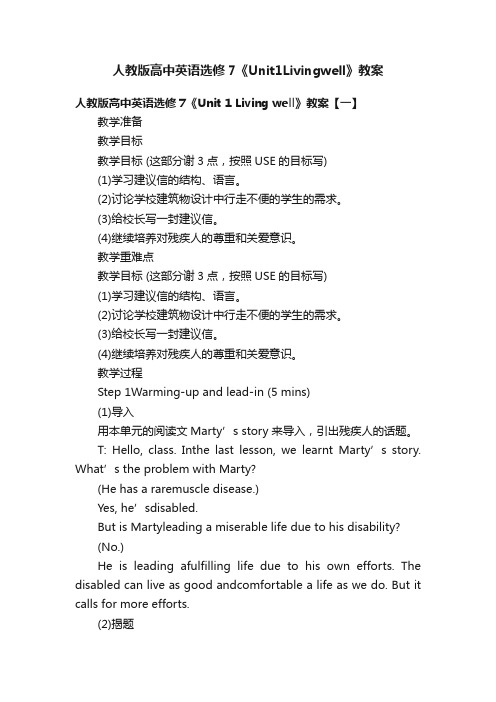
人教版高中英语选修7《Unit1Livingwell》教案人教版高中英语选修7《Unit 1 Living well》教案【一】教学准备教学目标教学目标 (这部分谢3点,按照USE的目标写)(1)学习建议信的结构、语言。
(2)讨论学校建筑物设计中行走不便的学生的需求。
(3)给校长写一封建议信。
(4)继续培养对残疾人的尊重和关爱意识。
教学重难点教学目标 (这部分谢3点,按照USE的目标写)(1)学习建议信的结构、语言。
(2)讨论学校建筑物设计中行走不便的学生的需求。
(3)给校长写一封建议信。
(4)继续培养对残疾人的尊重和关爱意识。
教学过程Step 1Warming-up and lead-in (5 mins)(1)导入用本单元的阅读文Marty’s story来导入,引出残疾人的话题。
T: Hello, class. Inthe last lesson, we learnt Marty’s story. What’s the problem with Marty?(He has a raremuscle disease.)Yes, he’sdisabled.But is Martyleading a miserable life due to his disability?(No.)He is leading afulfilling life due to his own efforts. The disabled can live as good andcomfortable a life as we do. But it calls for more efforts.(2)揭题教师通过展示我们学校的图片以及通过采访班上一位曾经有行走困难的学生,点出学校有些地方可能对行走困难学生带来不便。
然后说明教学目标:阅读一封建议信,讨论学校设施中可以改进的地方,以及写一封给校长的建议信。
T: We are lucky tobe able-bodied and study in such a beautiful school.But every now andthen, I find such students in our school. What are their problems?(They havedifficulty walking and they have to move around with walking sticks orwheelchairs.)T: This is SongYaoguang, our classmate. Yaoguang, what happened to you?Do you find itdifficult to walk around in our school with a walking stick?Do you think itnecessary to have our school reconstructed for the students with walkingdifficulty?(Yes.)T:If you have some suggestions, you can write asuggestion letter to our headmaster. Have you ever written such a letterbefore?So in today’slesson, we are going to1. read asuggestion letter2. discussproblems with the school facilities3. write a suggestionletter to the headmaster2 Reading (15 min)本课是读写结合的综合语言实践课,遵循USE的模式,即Understanding(理解)→Sharing(分享)→Expressing(表达)的模式。
高中英语选修七教案:unit 1 living well
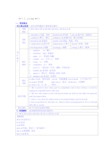
一、语言要点IV 重点词汇(旨在提供综合运用所需材料)1. ambition (n.) 雄心ambitious adj. 志向远大的; 有雄心壮志的;有野心的be ambitious for 极欲获得be ambitious of success渴望成功be ambitious to serve the people一心想为人民服务1) Her ambition is the presidency. 她的抱负是成为一名总统2) After several hours’ work, she had no ambition to go dancing. 没有精力去跳舞了3) The prince was attracted by the girl’s beauty, and ambitious to marry her.王子为女孩的美貌打动了,渴望能娶到她。
汉译英1) 他的理想就是环游世界。
_________________________________________________________________________________ __2) 作为一个志向远大的领导者,他想带领当地人们过上幸福的生活。
_________________________________________________________________________________ __Keys: 1)His ambition is to sail around the world. 2) As an ambitious leader, he wants to guide the local people to lead a happy life.2.beneficial (adj.) 有益的benefit v. &n.有助于;受益;利益,好处be beneficial to sth./sb.对……有益be of benefit to对……有益for the benefit of为了……(的利益)benefit from从……中受益1) A temperate climate is beneficial to the health; 温和气候有利于健康.2) Sunshine is beneficial to plants. 阳光对植物有益。
高中英语选修七教案Unit-1--Living-well
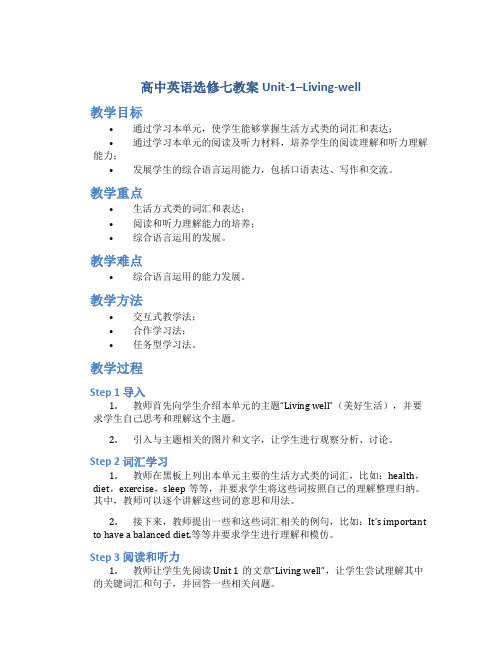
高中英语选修七教案Unit-1–Living-well教学目标•通过学习本单元,使学生能够掌握生活方式类的词汇和表达;•通过学习本单元的阅读及听力材料,培养学生的阅读理解和听力理解能力;•发展学生的综合语言运用能力,包括口语表达、写作和交流。
教学重点•生活方式类的词汇和表达;•阅读和听力理解能力的培养;•综合语言运用的发展。
教学难点•综合语言运用的能力发展。
教学方法•交互式教学法;•合作学习法;•任务型学习法。
教学过程Step 1 导入1.教师首先向学生介绍本单元的主题“Living well”(美好生活),并要求学生自己思考和理解这个主题。
2.引入与主题相关的图片和文字,让学生进行观察分析、讨论。
Step 2 词汇学习1.教师在黑板上列出本单元主要的生活方式类的词汇,比如:health,diet,exercise,sleep等等,并要求学生将这些词按照自己的理解整理归纳。
其中,教师可以逐个讲解这些词的意思和用法。
2.接下来,教师提出一些和这些词汇相关的例句,比如:It’s important to have a balanced diet.等等并要求学生进行理解和模仿。
Step 3 阅读和听力1.教师让学生先阅读Unit 1的文章“Living well”,让学生尝试理解其中的关键词汇和句子,并回答一些相关问题。
2.然后,教师在班级里播放一段与“Living well”相关的听力材料,并要求学生进行听力理解,并给出几个问题,让学生进行回答。
Step 4 综合语言运用1.教师组织学生进行小组讨论,让学生就如何“Living well”进行交流,让学生尝试用英语表达自己的想法和看法。
2.接着,教师要求学生进行写作练习,让学生就“Living well”的话题展开一段100字的写作。
Step 5 总结教师向学生概述本次课程的主要内容,并对学生的表现进行点评。
课后作业1.让学生进行生活方式类单词的记忆和复习。
人教版高二英语选修七Unit1 Living well教案设计

Unit 1 Living wellI.教材分析本单元以残疾及残疾人生活为话题,介绍了一些残疾人凭借顽强的毅力和社会的关爱克服生活中的种种困难,以积极的态度面对人生的挑战。
通过本单元的学习,可以帮助残疾学生树立生活的信心,激励残疾人实现自身价值;同时又能教育健康学生理解、尊重、关心、帮助残疾人,使残疾人与健全人一样共享美好生活。
通过本单元的言语技能训练,要求学生学会使用正确得体的英语介绍他人和向他人表示祝贺。
其中,USING LANGUAGE分为两部分,Listening and speaking是关于对残疾人Barry Minto的采访录音,要求学生能够通过录音了解Barry Minto的身体残疾和他取得的成就。
同时通过听这个采访,要求学生掌握表示祝贺的常用句型。
Reading, speaking and writing 部分要求学生先讨论腿脚残疾的人在电影院有可能遇到的困难,然后引出残疾Alice Major写给the newBankstown电影院的建筑设计师的一封信,在信中她给建筑设计师提出一些建议,要充分考虑残疾人的特殊需要。
这封信后有说和写的练习题,通过不同的言语技能训练,完成本单元教学目标。
通过读这份建议信,要求学生学会写建议信。
II.Teaching goals 教学目标1. Target language目标语言:重点词汇和短语access, company, in comfort, meet with, dignity, profit2. Ability goals能力目标Help students to learn about disabilities and life of the disabled. Enable students to do something for the disabilities.3. Learning ability goals学能目标By making designs for the convenience of the disabled, students will learn how to think for others and help others.Teaching important points教学重难点Enable students to design a building or equipments for the disabled.Teaching methods教学方法Discussing, explaining, reading and practicingTeaching aids教具准备Multimedia computerTeaching procedures & ways教学过程与方式Step I Leading inShow students a few pictures of different places of our school. Then ask students the following question:How can we adapt the buildings or the equipment or some means of transport to make them more accessible to people in wheelchairs?Discuss with the class , and then show students the pictures of some equipments which are designed for the disabled.Step II Reading 2 A letter to an architect1.Read the letter and list the suggestions the writer put forward.Suggestions1——→ Adequate access for wheelchairs.2——→Earphones for people who have trouble hearing.3——→Raised seating.4——→Toilets.5——→Car parking.2.ScanningAsk students to read the letter again and in pairs discuss the questions before writing the answers.1) What is the purpose of the first paragraph of the letter?(To tell the readers the purpose of the letter.)2) What is the purpose of the last paragraph of the letter?(To finish the letter in a polite way and to put forward some reasons why the architect should consider the writer’s suggestions.)3.Suggestions to the architectLiftsEarphonesSeatsToiletsCar parking1)Make the buttons easy to reach and the doors wide enough to enter . Make thecinema accessible to people in wheelchairs.2)Adequate access for wheelchairs. (Para2)A. means of entering/ way inB. opportunity or right to use sth. (A)3) Fit (安装/ Fix(使固定)sets of earphones to all seats to allow hearing-impaired customers to enjoy the company of their friends.4)This would allow hearing-impaired customers to enjoy the company of their hearing friends.A. firmB. companionC. fellowD. being together with sb5)The seats at the back should be placed higher than those at the front, and there could be a space at the end of each row for people in wheelchairs to sit next to their friends.Step III Language Points&Practice1. access n. [U] ~ to sth./ sp.①(接近/进入某地的)通路/途径进入农场的唯一途径是穿过田野。
高中英语 Unit1《Living well》学案3 新人教版选修7
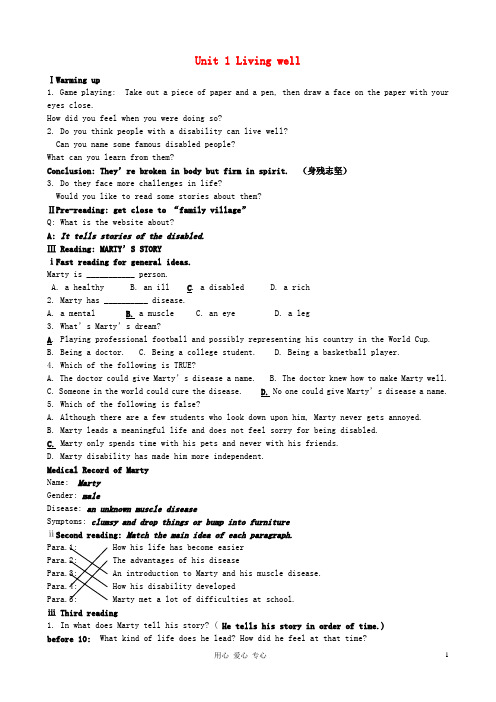
Unit 1 Living wellⅠWarming up1. Game playing: Take out a piece of paper and a pen, then draw a face on the paper with your eyes close.How did you feel when you were doing so?2. Do you think people with a disability can live well?Can you name some famous disabled people?What can you learn from them?Conclusion: They’re broken in body but firm in spirit. (身残志坚)3. Do they face more challenges in life?Would you like to read some stories about them?ⅡPre-reading: get close to “family village”Q: What is the website about?A: It tells stories of the disabled.Ⅲ Reading: MARTY’S STORYⅰFast reading for general ideas.Marty is ___________ person.A. a healthyB. an illC. a disabledD. a rich2. Marty has __________ disease.A. a mentalB. a muscleC. an eyeD. a leg3. What’s Marty’s dream?A. Playing professional football and possibly representing his country in the World Cup.B. Being a doctor.C. Being a college student.D. Being a basketball player.4. Which of the following is TRUE?A. The doctor could give Marty’s disease a name.B. The doctor knew how to make Marty well.C. Someone in the world could cure the disease.D.No one could give Marty’s disease a name.5. Which of the following is false?A. Although there are a few students who look down upon him, Marty never gets annoyed.B. Marty leads a meaningful life and does not feel sorry for being disabled.C. Marty only spends time with his pets and never with his friends.D. Marty disability has made him more independent.Medical Record of MartyName: MartyGender: maleDisease: an unknown muscle diseaseSymptoms: clumsy and drop things or bump into furnitureⅱSecond reading: Match the main idea of each paragraph.Para.1: How his life has become easierPara.2: The advantages of his diseasePara.3: An introduction to Marty and his muscle disease.Para.4: How his disability developedPara.5: Marty met a lot of difficulties at school.ⅲ Third reading1. In what does Marty tell his story? ( He tells his story in order of time.)before 10: What kind of life does he lead? How did he feel at that time?after 10 : What happened to him? What about his feeling? What was his problem when he was in primary school?at high school: How did he describe his life at high school?now: How is his life like? What about his feeling?2. How did his feeling change?Conclusion: the change of Marty’s hopeful worriedhappy satisfied3. What kind of person do you think Marty is?From his motto: Live one day at a time, we can see that Marty is an /a optimistic, brave, stupid, pessimistic, independent, strong-minded…person.4. Why has his fellow students’ conduct changed towards Marty?A. Because they are now high school students.B. Because they are all disabled people.C. Because Marty is now a healthy boy like them.D. Because they found that Marty was able to live as rich and full a life as everyone else.ⅳ SummaryMarty Fielding has a muscle disease that sometimes makes him very weak and he can’t run or climbstairs as quickly as other people. The doctors don’t know how to make him better. Fortunately,Marty has learned to adapt to his disability. He used to dream about one day playing professional football and representing(represent) his country in the World Cup. He doesn’t look any differentfrom other people. So sometimes kids laugh at him when he gets out of breath. Life is much easier (easy) at high school than it was at primary school. Even when he is made fun of, he does notget annoyed. (annoy) Disabled as he is, Marty has become stronger and more independent. He suggeststhat we normal people should give the disabled more encouragement rather than laugh at them.。
人教版英语选修七 Unit 1 Living well 教案

Unit 1 Living well一、学生情况分析本单元的设计与实施是建立在学生经过高一新教材学习基础之上。
学生已经逐步适应了在活动与任务中学习英语以及如何处理语言知识与活动开展的关系。
并且,他们也已经形成并培养了一定的小组合作学习及自主学习的能力。
对于残疾人的生活和学习这一话题,同学们并不感到陌生,相信这能引起学生的兴趣,并激发学生的探究心理。
二、教材分析(一)教材地位与作用Living well高中英语选修7 第一单元的内容。
本单元以残疾及残疾人生活为中心,介绍了一些残疾人凭借顽强的毅力和社会的关爱克服生活中的种种困难,以积极的态度面对人生的挑战。
本课时是第一课时,包括Warming Up,Pre-reading,Reading和Comprehending四部分。
通过本节课的学习,提高学生理解、尊重、关心、帮助残疾人意识,使残疾人与健全人一样共享美好生活。
它在整个单元教学中占有十分重要的地位。
这是对新课程目标中情感态度与价值观培养目标的全方位体现。
基于以上教材的分析,根据新课程标准要求,我确立如下教学目标:(二)教学目标1. 知识目标a. 掌握以下重点词汇和短语ambition, disability, fellow, independent, beneficial, encouragement, in other words, all in all, out of breath, make fun of.b. 理解和运用以下重点句型1. I have to adapt to my disability.2. Just accept them for whom they are and give them encouragement to live as rich and full a life as you do.2. 能力目标a. 通过对段落结构的分析,使学生掌握scanning的阅读技巧。
人教选修七 Unit1 Living well 教案-word

BOOK 7 Unit1 Living well目标认知重点词汇与短语:ambition, disability, suitable,beneficial,adapt, absence, annoy, access, assistance, congratulatein particular, in other words, adapt to, cut out, out of breath, all in allas well as, make fun of, meet with重点句型:1.疑问词+不定式2.so that3.be + adj. +to do4.used to单元重点语法:动词不定式重点词汇ambition【原句回放】Her ambition is to become part of the national team for the next Paralympic Games.(Page 1)【点拨】ambition: determination to be successful, rich, powerful etc. 用作不可数名词表“雄心,抱负”;用作可数名词表“渴望得到或追求的东西”。
【拓展】ambitious (a.有雄心的)常用短语:be ambitious for sth/to do sth 对(做)某事怀有雄心/热切的希望suitable【原句回放】Although some may think the cinema is noisy, it is suitable for Sally's condition.(Page 1)【点拨】suitable:adj.合适的,适宜的。
常用短语:be suitable for sb./sth. be suitable to do sth.【拓展】suit (v.)适合,相称;(n.)一套(衣服),套装disability【原句回放】Do you know anyone with a mental or physical disability? (Page 1)【点拨】disability:being unable to do sth., esp. taking away the power of using the leg or arm. 用作可数名词表“残疾”;用作不可数名词表“无能、劳动能力丧失”。
人教版选修7unit1 Living well P3 教学设计-教育文档
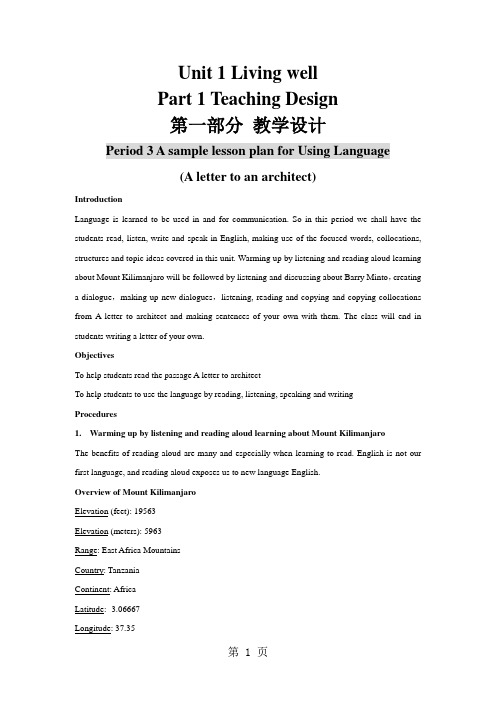
Unit 1 Living wellPart 1 Teaching Design第一部分教学设计Period 3 A sample lesson plan for Using Language(A letter to an architect)IntroductionLanguage is learned to be used in and for communication. So in this period we shall have the students read, listen, write and speak in English, making use of the focused words, collocations, structures and topic ideas covered in this unit. Warming up by listening and reading aloud learning about Mount Kilimanjaro will be followed by listening and discussing about Barry Minto,creating a dialogue,making up new dialogues,listening, reading and copying and copying collocations from A letter to architect and making sentences of your own with them. The class will end in students writing a letter of your own.ObjectivesTo help students read the passage A letter to architectTo help students to use the language by reading, listening, speaking and writingProcedures1.Warming up by listening and reading aloud learning about Mount KilimanjaroThe benefits of reading aloud are many and especially when learning to read. English is not our first language, and reading aloud exposes us to new language English.Overview of Mount KilimanjaroElevation (feet): 19563Elevation (meters): 5963Range: East Africa MountainsCountry: TanzaniaContinent: AfricaLatitude: -3.06667Longitude: 37.35Difficulty: Walk upBest months for climbing: December, January, February, March, June, July, AugustV olcanic status: ExtinctYear first climbed: 1889Convenient Center: Marangu via Moshi, TanzaniaNearest major airport: Nairobi, Kenya2. Listening and discussing about Barry MintoBarry Minto is being interviewed by a radio reporter about his climbing of the Mount Kilimanjaro. Now listen to the recording and do exercises 1 and 2 on page 6.3. Creating a dialogueOn page 7 there are several situations. Now read them and create dialogues with your partners.4. Making up new conversationsCould we make us of the collocations and structure patterns learned so far in this unit to make a conversation about the car accident? Just have a try.5. Listening, reading and copyingNow it is time to listen to the letter. Go to page 8, please.Now read the text A letter to an architect on page 8 to: cut/ the sentence into thought groups, blacken the predicates, darken the connectives and underline all the useful collocations.6. Copying collocations from A letter to architect and making sentences of your own with themA collocation is two or more words that often go together. These combinations just sound "right" to native English speakers, who use them all the time.While going over the text, try to recognize the collocations, treat them as single blocks of language and copy them out into your Collocation Book.7. Closing down by writing a letter of your ownTo end this period we are to write a letter of suggestion based on the one learned just know.。
人教版高中英语选修七Unit+1+Living+well+(3)+教案.doc
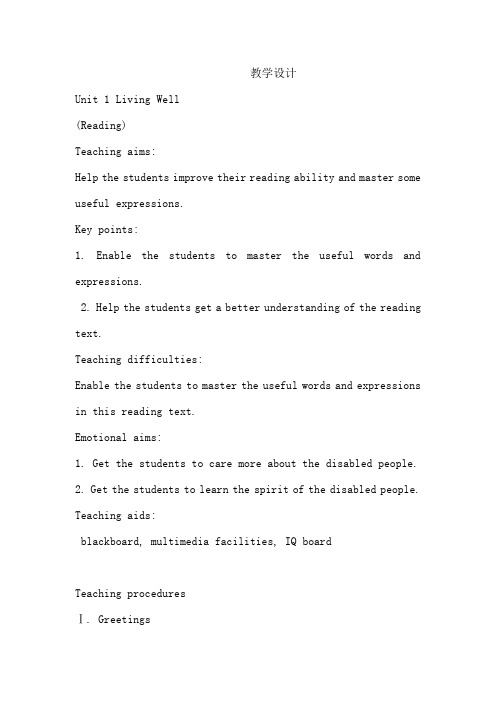
教学设计Unit 1 Living Well(Reading)Teaching aims:Help the students improve their reading ability and master some useful expressions.Key points:1. Enable the students to master the useful words and expressions.2. Help the students get a better understanding of the reading text.Teaching difficulties:Enable the students to master the useful words and expressions in this reading text.Emotional aims:1. Get the students to care more about the disabled people.2. Get the students to learn the spirit of the disabled people. Teaching aids:blackboard, multimedia facilities, IQ boardTeaching proceduresⅠ. GreetingsⅡ. Lead ina short video (Nick Vujicic)Ⅲ. Revision (the reading skills)Task1 Match each paragraph with their main ideas. Paragraph 1 Marty met a lot of difficulties at school. Paragraph 2 An introduction to Marty and his muscle disease.Paragraph 3 How his disability developed.Paragraph 4 The advantages of Marty’s disease. Paragraph 5 How Marty’s life has become easier and his interests, hobbies and ambition.Task 2 Choose the best answer for each question.1. When Marty says “I am one in a million”, he really means he _______.A. is uniqueB. has a rare diseaseC. has many petsD. lives a hard but happy life2. Why did the doctors cut out a piece of muscle from Marty’s leg?A. Because they could cure the disease by cutting it out.B. Because they wanted to use it as a specimen (标本).C. Because they would transplant the new muscle.D. Because they wanted to find out the cause of the disease.3. What’s Marty’s dream when he was a child?A. Being a professional football player and representing his country in the World Cup.B. Being a doctor.C. Being a college student.D. Being a basketball player.4. What shouldn’t people do for the disabled?A. Encourage them to live as rich and full a life as you do.B. Accept them for who they are.C. Feel sorry for them.D. Don’t ignore them.Ⅳ. Presentation (the language points in the text)students' presentation, and teacher’s complement1. In other words, there are not many people like me.Fill in the blanks by using in other words, in a word, in words.1).Your performance in the driving test didn’t reach the required standard. ______________, you failed.2). Can you express what you are feeling ________?3). __________, the future of the world is bright.4). He found his first job. ___________, he needn’t depend on his father any more.2. Unfortunately, the doctors don’t know how to make me better, but I am very outgoing and have learned to adapt to mydisability.1). He found __________________ (很难适应) the new surroundings in his college life.2). My parents started learning to buy things on the Internet to _______________________(适应不断变化的社会).3). 他的三部小说被改编成了电视剧。
人教版选修7unit1 Living well P3 教学设计

5. ,
. 8, .
A 8 : , , .
6.A
A . "" , .
, , .
A
…在报纸上读到……,…考虑……的问题,为残疾观众提供方便,特别,考虑以下问题,通向……;走路有困难的,通往电影院各个部分的电梯,电梯里的按钮,坐轮椅的人,在电影院的后排,,在不显眼的地方,和其他顾客一样重要,为听力有障碍的人提供的耳机,在所有座位的旁边, a坐在特殊的地方,抬高的座位,容易看到屏幕,在每排的最后,坐在朋友的身边,离电影院入口近,只有一个供残疾人使用的厕所,在地下室, a…离……遥远,停车场,考虑我的建议,…与……有同样的机会,健全人,…有尊严地做……
1
第一部分
3 A
(A)
. , , , , , .,a,,,A .a.
A
, ,
1.
. , .
(): 19563
(): 5963
:EastAfricaMountains
:Tanzania
:Africa
: -3.06667
: 37.35
:
: , , , , , ,
:
: 1889
:Moshi,Tanzania
:Nairobi,Kenya
:a . , .
2.
a.
1 2 6.
?
I a , a ቤተ መጻሕፍቲ ባይዱ - !
I . I . — a ?
.
.
.
.
a .
3. a
7 . .
1
A: I .
B: !
A: I I .
B: I’m .
A: I .
B: I .
A: I . I .
- 1、下载文档前请自行甄别文档内容的完整性,平台不提供额外的编辑、内容补充、找答案等附加服务。
- 2、"仅部分预览"的文档,不可在线预览部分如存在完整性等问题,可反馈申请退款(可完整预览的文档不适用该条件!)。
- 3、如文档侵犯您的权益,请联系客服反馈,我们会尽快为您处理(人工客服工作时间:9:00-18:30)。
Period 3Grammar
Teaching aims
1.Students will be able to recognize the infinitives and know the exact meanings of them.
2.Students will be able to use these structures correctly.
Teaching procedures
Step 1Revision
Step 2Discovering useful structures
1.基本概念
不定式是动词的一种非谓语形式,没有人称和数的变化,而且不能单独用作谓语,但仍旧有动词的特点,即可有自己的宾语和状语,构成不定式短语,使用频率较高。
是一个考试经常考查的语法点。
2
不定式具有名词、形容词、副词的特征,在句中可以充当主语、表语、宾语、定语、状语和补足语,还可以有自己的逻辑主语,即for sb. to do sth.。
It is good to_help_others.(subject)
It is my ambition to_make_sure_that_the_disabled_people_in_our_neighbourhood_have_ access_to_all_public_buildings.(subject)
My ambition is_to_work_in the computer industry when I grow up.(predicative)
I don't have time to_sit_around feeling sorry for myself.(attributive)
I am the only student in my class to_have_a_pet_snake.(attributive)
A big company has decided to_buy_it_from_me.(object)
My fellow students have begun to_accept_me_for_who_I_am.(object)
I have had to work hard_to_live_a_normal_life.(adverbial)
Some days I am too tired to_get_out_of_bed.(adverbial)
We must call on local government_to_give_financial_assistance_to_disabled_people. (object complement)
4.不定式的时态与语态
根据需要,不定式可以有一般式(to do),完成式(to have done),完成进行式(to have been doing),进行式(to be doing)等时态形式以及被动形式to be done和to have been done。
He didn't allow us to go home early.
他不允许我们早回家。
He seemed to have seen the film.
他好像看过这部电影。
She is said to have been living in the city for six years.
据说她住在该城市六年了。
The boy pretended to be reading when his mother came in.
当他母亲进来的时候,小男孩假装在读书。
He is said to have studied abroad a few years ago.
据说他几年前在国外学习过。
The book is said to have been translated into many languages.
据说此书已被译成了多种语言。
[注意]
1.The following verbs are usually followed by the infinitive.
afford,agree,appear,arrange,ask,attempt,care,choose,claim,come,consent,dare,decide,demand,deserve,determine,elect,endeavor,expect,fail,get,guarantee,hate,help,hesitate,hope,hurry,intend,learn,long,manage,mean,need,offer,plan,prepare,pretend,promise,refuse,say,seem,tend,threaten,want,wish For example:
I can't afford to_go to the pub.
He agreed to_practice_more.
You should learn to_express_yourself.
They managed_to_fix_the_problem.
2.Explanation of the gerund and the infinitive
Some words can be followed by either the infinitive or the -ing form. Please pay attention when there is no difference in meaning and when there is difference.
(2)Some verbs or verb phrases have different meanings when used with the gerund or
Step 3Drilling
Ask students to do Exercise 2 on Page 5 and check with their partners then check together.
Keys:to have kept you waiting;to have forgotten;to have finished;
Ask students to do Exercise 3 and share their past experience in a group.
Keys:to have spent;To free;to see;to treat;to help pass;to abolish
Step 4Using the infinitive
Ask students to translate the following sentences into English and pay attention to the use of the infinitive.
1.我忘了让你去社区服务中心了。
2.在检查机器之前关掉电源是很重要的。
3.我不知道哪儿能找到这种纽扣。
4.幸运的是,我们没有更多的活儿要做。
5.海伦很高兴到过中国20多个省、市。
6.她事业有成,现在最大的愿望就是结婚生子。
Suggested answers:
1.I forgot to ask you to go to the community service center.
2.It's very important to turn off the electricity before you check the machine.
3.I don't know where to find such a kind of button.
4.Luckily,we don't have much more work to do.
5.Helen is very pleased to have traveled in more than 20 provinces and cities in China.
6.She has been very successful in her work,and now her greatest wish is to get married and have some children.
Step 5Homework
Finish off Exercises 2 and 3 on P49.。
